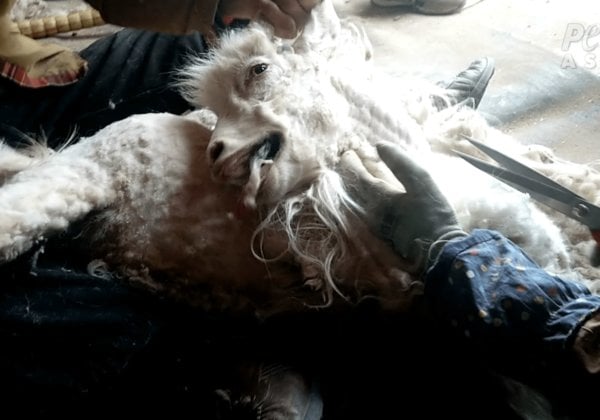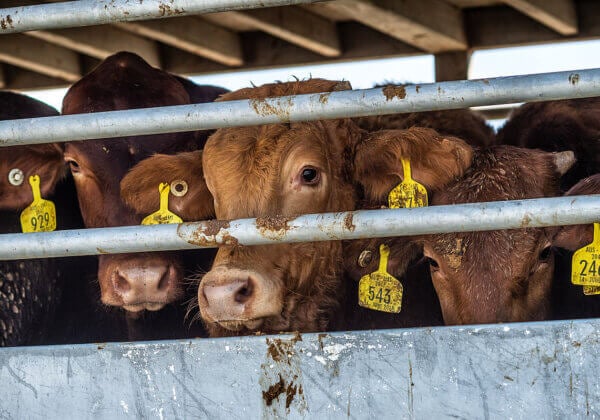Mulesing – A Barbaric and Unnecessary Cruelty
Australia is the world’s largest supplier of wool.
The most commonly raised sheep are merinos, who are not native to Australia.
Merinos are bred to have wrinkly skin, which means more wool per animal. This unnatural overload of wool causes many sheep to collapse and even die of heat exhaustion during hot months, and the wrinkles collect moisture, especially under the tail. Attracted to the moisture, flies lay eggs in the folds of skin, and the hatched maggots can eat the sheep alive, a condition known as “flystrike”.

Many Australian farmers perform a barbaric procedure called “mulesing” even though it is not commonly practised anywhere else in the world. In mulesing, workers force live sheep onto their backs, restrain their legs between metal bars and, often without any painkillers whatsoever, cut chunks of flesh from the animals’ backsides or attach vice-like clamps to their flesh until it dies and sloughs off. Both procedures are terribly painful for the sheep to endure.
This mutilation is performed in an attempt to produce smooth, scarred skin that won’t harbour fly eggs, but the bloody wounds often get flystrike before they heal. In one investigation, sheep were found to have died from flystrike even though they had already been mulesed.
Mutilating sheep is not only cruel but also ineffective. Better husbandry is the answer, not mutilating animals.
There are many humane methods already being used successfully by many farmers in Australia, and New Zealand has stopped mulesing altogether. Sheep can be spared maggot infestation through closer monitoring, timely shearing and applying insecticides during fly season.
However, the most obvious humane alternative to mulesing is simply to breed for bare-breech sheep, who are better suited to the Australian climate and less susceptible to flystrike. The Commonwealth Scientific and Industrial Research Organisation has stated, “Selective breeding for sheep with a naturally bare and wrinkle-free breech area, resistant to flystrike, is widely considered the best long-term alternative to mulesing”.

Experts state that an intensive breeding programme could produce an entire Flystrike-resistant flock within two years. Currently, more than 20 per cent of Australian farmers don’t mules, and companies such as SRS and I-Merino are already producing wool without mulesing sheep.
New Zealand has been virtually free of mulesing for almost ten years.
As Jim Watts of Merino Australia has said, “[I]t is not difficult to breed a plain-bodied Merino sheep that does not need to be mulesed, has superior meat traits and produces high fleece weights of low diameter wool”.
H&M, Perry Ellis, HUGO BOSS, Adidas and numerous other companies have pledged to move away from mulesed wool or implemented an outright ban on wool from lambs who have been mulesed.
You can help, too, by refusing to buy wool of any kind and by urging the Australian government to outlaw mulesing mutilation today.
View the 'PETA-Approved Vegan' Clothing ListFind Out More About Wool:
The Cruelty of Wool | Environmental Hazards of Wool Production | Ultra-Fine Wool | Saleyards







